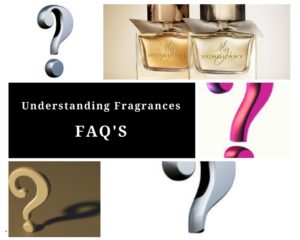Perfume 101 | Understanding Fragrances | FAQ’S

Below we have addressed some of your most frequently asked questions regarding fragrances. HERE ARE THE TOP 10:
1.) Fragrances, what’s the difference?
The basic differences between fragrances are simply a matter of the amount or concentration of oils in the fragrance. The higher the concentration of oils the longer your fragrance will last, and the less you need to apply.
2.) What’s the difference between Parfum, Eau de Parfum, Eau de Toilette, Eau de Cologne and Eau Fraiche?
| FRAGRANCE STRENGTH | DESCRIPTION |
| Parfum/Perfume: | Is a term used to describe the highest amount or concentration of oils in a fragrance - the purest form of fragrance, and is the longest-lasting on the skin. It is also the most expensive. |
| Eau de Parfum (EDP): | Is a term used to describe the closest form to perfume. Eau de Parfum is less expensive than pure perfume. |
| Eau de Toilette or Toilet Water (EDT): | Is a term used to indicate that it was created with a lighter concentration of fragrance oils which makes it more subtle than Eau de Parfum or EDP. Eau de Toilette is ideal for an all-over-the-body base for perfume applications, designed for shorter wear on the skin. |
| Eau de Cologne/Cologne: | Is a term used to describe the lightest form of fragrance. Cologne may be used generously as an after-bath refreshant. |
| Eau Fraiche: | Eau Fraiche is similar to Eau de Cologne in that the scent will generally last a short while, up to two hours. Eau Fraiche has an even lower concentration of fragrance oils than Eau de Cologne. Eau Fraiche does not contain a high amount of alcohol and along with the fragrance, the remainder of Eau Fraiche is mostly water. |
3.) How should I store fragrances?
Fragrances should be kept in a cool, dry area away from excessive heat or cold. To avoid evaporation, the cap must be tightly closed to maintain fragrance integrity. Do not expose the fragrance for any length of time to sun light and keep away from windows as sunlight can unbalance the various ingredients. Also, an opened bottle should be kept in its box to insure a longer shelf life.
4.) How can I make fragrance last longer on my skin?
First, understand that our individual PH levels will determine how each ingredient in a fragrance will react on our skin. For instance, someone who has dry skin will most likely find that their fragrance will not lasts as long as someone who has oily skin. Oily skin carries more natural moisture to actually hold in the fragrance.
To achieve a longer lasting effect, try layering your fragrance with products from the same product line. First try using fragrance bath gel/shower cream, then the moisturizer (skin lotion/body cream), then apply your eau de Parfum, eau de Toilette, or Eau de Cologne. You may also use a fragrance free moisturizer to achieve this affect.
5.) What is the proper way to apply fragrance to my skin?
Fragrance should be applied to what we call the “pulse points.” Pulse points are where the skin is especially warm and where there is good blood circulation. This is because heat helps diffuse and magnify the aroma of fragrance. Because heat rises, it should be applied to several pulse points; the inner wrists (when applying to the inner wrists, do not rub wrist together as it will bruise the notes, dull their development), the base of the throat, behind ear lobes, and the crook of the arm and knees. As you wear your fragrance, it will react with your body heat and continue to emit scent throughout the day.
6.) When is the best time to apply fragrance?
If you decide to wear fragrance, you should always apply it before putting on your clothes and jewelry. Some fragrances have a tendency to leave permanent stains on fabrics, hardware, and even pearls.
7.) When shouldn’t I wear fragrance?
It’s not a good idea to wear fragrance if you’re planning to be in the sun. Most fragrances have a tendency to react with ultraviolet light, which will irritate the skin and often cause skin discoloration. If you desire to wear fragrance, and will be in the sun for an extended period of time, there are some (specially formulated/alcohol-free) available.
8.) What makes a fragrance smell differently on someone else?
It’s true, no two people were made alike, we each carry our own scent that will influence the affect of fragrance on our own skin. Body chemistry, genes, age, diet, medication intake, stress level and the temperature of our skin contributes to the affect fragrances may have on our skin. There are a lot of essential oils in fragrances as well. And there are certain types of oils that have attraction to our skin, and those may very well absorb, while others may not. This type of imbalance on the skin is what contributes to the difference in the way a fragrance may smell on you verses someone else.
9.) Why do we smell coffee beans at the fragrance counters?
Perfumer’s have coffee beans readily available for customers to sniff in between testing fragrances because it’s supposed to reduce or reverse olfactory fatigue or odor fatigue. Olfactory fatigue is the temporary, normal inability to distinguish a particular odor after a prolonged exposure to that airborne compound. So in order to reset the senses, a sniff of coffee beans is what should do the trick.
Another common way believed to reduce olfactory fatigue is to smell your own unperfumed skin (typically the crook of the elbow), or to smell lemon or just plain air. These views are all controversial as some researchers indicate that they’ve had positive reactions while others say that smelling coffee beans has no benefit what so ever. Next time you are at the fragrance counter, put what researchers have said to a test then you may determine if sniffing coffee beans really does reset your senses or if it’s simply just a myth.
10.) What is the best way to travel with fragrances?
Because of airline restrictions we are limited as to how many ounces of liquid we may board on an airline (see TSA.com for liquid guidelines). We suggests traveling with your fragrance in a fragrance atomizer. But if you have to take your bottle, it should be taken as a carry-on and NOT stored away in your suitcase as the air pressure changes in the baggage compartment which may cause fragrance sprays to leak.
We hope this information was helpful.
Stay tuned for more answers to your FAQ’S…







Wow, I did not know any of that! Especially how heat effects cologne because I kept a bottle in the car for refreshing. Thanks for the info Lenor’s Closet!
Glad I was able to help. Yes, heat/sunlight is not a friend of fragrance 🙂
Wow very informative!!
I’m glad this information was helpful to you. More on the way!
Thank you! Great tips! 🙂
No problem. More to come!